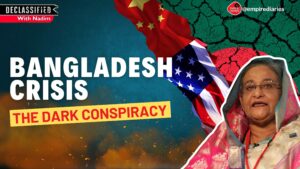
 Ratna
Ratna
New Delhi, December 1, 2020: As the standoff between protesting farmers and the Indian state continues, firebrand rights activist Medha Patkar is banking on the emergence of a “historic and unprecedented unity” among the protesters against a government that she says is trying to create an atmosphere of “divide-and-rule” to weaken the movement.
“There’s a historical unity between farmers and industrial workers that has come to the forefront at these protests,” the 66-year-old Patkar said, underlining the need to widen the network of protests that have been taking place separately and integrate them into a larger movement too big to ignore.
‘ALLIANCE OF ALLIANCES’
“What we need is an alliance of alliances, as I always call it,” said Patkar, architect of the gritty Narmada Bachao Andolan (NBA) who also started the National Alliance for People’s Movements (NAPM). “The situation is such that it’s not easy to say we can fight independently of each other. Everyone had to come together, and the unity I see is unprecedented.”
India’s national capital has been hitting the global headlines in recent days after hundreds of thousands of angry farmers from various states converged on New Delhi, daring the government to scrap a fleet of newly-passed farm laws.
A set of three agricultural reform laws were cleared recently that will allow private entities to directly buy farm produce from the farmers, without having to rely on a government-run intermediary system.
But India’s farmers fear the new laws will put them at the mercy of powerful corporate players who will buy the farm produce on their own terms, and more importantly, the state-backed financial cover of ‘minimum support prices’ could also disappear.
‘DIVIDE AND RULE’
As countless farmers have swooped into New Delhi from the neighbouring states, sparking blockades at the national capital’s borders, the government is seeking to tactically split up the movement by selectively currying favours, argued Patkar.
“A divide-and-rule approach is happening here,” the veteran activist pointed out. “This particular government is expert at doing that.”
Patkar’s sharp remark was in reference to the Indian state’s decision to selectively hold negotiations with only some farmers’ organisations that hail from Punjab.
“The government would be planning to concede some of the demands to Punjab,” she said. “They are trying to ultimately manipulate the situation – doling out benefits only to the Punjab farmers. They want to divide our organisational unity. These efforts and tactics will continue.”
‘HOPEFUL’ OF BREAKTHROUGH, BUT ‘LONG-TERM FIGHT’
Patkar, who is optimistic about the growing impact that farm labourers and industrial workers have when they protest as a unified force, is hopeful of a breakthrough.
“I am very hopeful of a breakthrough, and it’s necessary to be hopeful,” she said, warning that the dissidence is set to be a long-term affair. “See, we have immediate targets. We want all three anti-farmer laws as well as the electricity (amendment) bill to be scrapped for the time being. But to get these moves scrapped, we have to protest and confront them for a long time it seems.”
Patkar cited the instance of the 2013 land acquisition act when the state was compelled to back down after sustained pressure from masses of people.
“Likewise, in this case too, it’s important that we force the issue and turn the farmers’ protest into a national movement,” she said. “Let’s see, hum dekhenge (we’ll see how it goes). They also won’t back down so easily. Even after a round of dialogue, we learnt via Mann ki Baat that he (Indian Prime Minister Narendra Modi) is in favour of the farm laws and hence does not have any intention of taking it back.”
DRAFT BILLS
Countering what the farm laws are offering, the AIKSCC has drafted its own version of what the rules ought to be. It has come up with two draft bills that seek farmers’ complete freedom from debt, and appropriate and justifiable prices for all farm produce.
Patkar isn’t interested in the state’s condition that the protesting farmers would be allowed to enter New Delhi only if they agree to camp at a ground in Burari – which is away from the city’s nerve centre.
“We wanted to protest at Ram Lila maidan, it was rejected. We wanted to do it at Jantar Mantar, that was rejected too. There will be no entry to Delhi, we were told. That’s when we decided to carry out the mission ghera dalo, dera dalo (if you stop us from entering, we will block the path),” Patkar said. “So when the borders were eventually blocked, the Delhi government reviewed the situation and offered us Burari ground. But people felt Burari would be an open jail, there would be lots of policemen stationed there. They had deliberately planned to corner us. Only some protesting organisations actually went to Burari.”
‘CRISIS IS AN OPPORTUNITY’
The activist, who has been championing the cause of people displaced by dams in the Narmada Valley and has been pushing numerous other rights issues, criticised the state for selectively using fear of the coronavirus pandemic for strategic reasons.
“You know, there’s a Chinese proverb – crisis is an opportunity,” Patkar said, referring to the government showing concerns of the spread of Covid-19 due to the farmers’ protest. “They are creating fear. The government is using it as an opportunity. Some people, however, are now realising what’s happening.”
During the recent election rallies in India, “corona was hidden, but now it has emerged again from under the carpet. Well, lots of people understand all that”, she observed.








